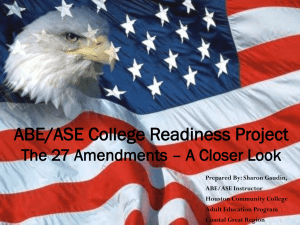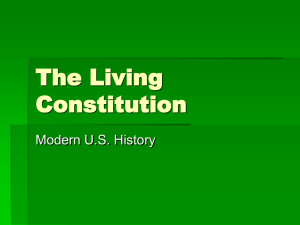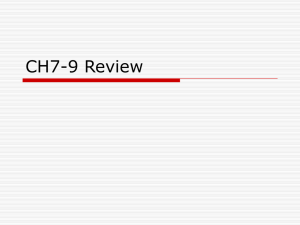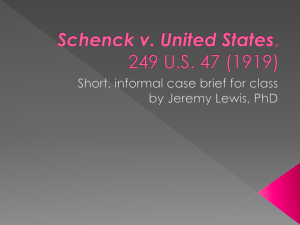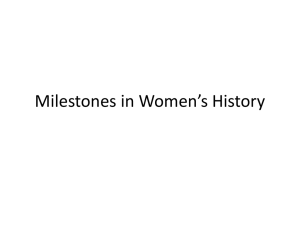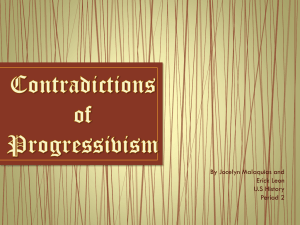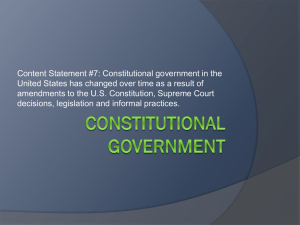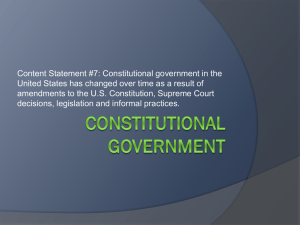Zulfiqar H. on 18th Amendment
advertisement
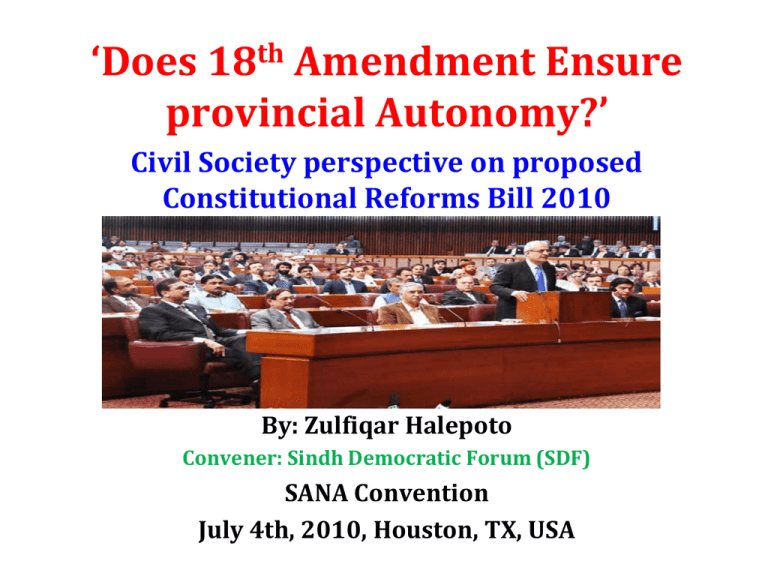
‘Does 18th Amendment Ensure provincial Autonomy?’ Civil Society perspective on proposed Constitutional Reforms Bill 2010 By: Zulfiqar Halepoto Convener: Sindh Democratic Forum (SDF) SANA Convention July 4th, 2010, Houston, TX, USA Bicameral Parliamentary System and power Sharing. • Bicameral Parliamentary System was introduced in 1956 constitution • National Assembly of Pakistan • The senate of Pakistan • Prime Minister and the President • Provincial Assemblies who elects the President as custodian of the federation • Constitution of Pakistan 1973-I • Preamble • Part I: [Articles 1-6] Introductory • Part II: Fundamental Rights and Principles of Policy [Articles 7-40] • Part III: The Federation of Pakistan [Articles 41-100] • Part IV: Provinces [Articles 101-140A] • Part V: Relations between Federation and Provinces [Articles 141-159] Constitution of Pakistan 1973 II • Part VI: Finance, Property, Contracts and Suits [Articles 160-174] • Part VII: The Judicature [Articles 175-212B] • Part VIII: Elections [Articles 213-226] • Part IX: Islamic Provisions[Articles 227-231] • Part X: Emergency Provisions [Articles 232237] • Part XI: Amendment of Constitution[Articles 238-239] • Part XII: Miscellaneous [Articles 240-280] Amendments (1974-2010) • • • • • • • • • • • • • • • First Amendment (1974) Second Amendment (1974) Third Amendment (1975) Fourth Amendment (1975) Fifth Amendment (1976) Sixth Amendment (1976) Seventh Amendment (1977) Eighth Amendment (1985) Tenth Amendment (1987) Twelfth Amendment (1991) Thirteenth Amendment (1997) Fourteenth Amendment (1997) Sixteenth Amendment (1999) Seventeenth Amendment (2003) Eighteenth Amendment (2010) Major Amendments in 1973 Constitution of Pakistan • The 8th Amendment (enacted by Gen. Zia ul Haq) had altered over 90 Articles of the Constitution. • The 17th Amendment (enacted by Gen. Pervez Musharraf) had altered 26 Articles of the Constitution. • The 18th Amendment 9enacted by the present PPP government has altered 100 articles of the Constitution Mandate and ToR of the CRC Critical Review of Selected Amendments: I Positives: Article 264: repeal of 17th Amendment. LFO repealed. Article 1 (a): Pakhtoonkhwa. Sindh and Balochistan. Article 6: Attempt to suspend the Constitution or hold in abeyance is high treason. No legal validation even by the Supreme Court. A New Article inserted after Article 10: Right to fair trail. Article 19: Right to Information. Article 25: Right to Education. Critical Review of Selected Amendments: II Positives: Article 38: share of provinces in all FS, MNs and ABs. Past injustices omitted or rectified Article 58: Dissolutions of NA with the consent of PM. Article 58 (2) b: Abolished Article 167: Direct loaning, Funding and projects Article 37: Equal opportunities/ compensation 3 main points of 17th amendment were retained •Voter age. •Women Seats. •Joint Electorate. Critical Review of Selected Amendments: II Negatives: Article 51: National Assembly Composition: A complete hegemony of a single province. The Senate shall consist of 100 members: Current Composition 14 members from each Provincial Assembly. 08 members from FATA. 04 from the Federal Capital Islamabad. 04 women on special seats from each Provincial Assembly. 04 technocrats on special seats from each Provincial Assembly. Where is the equality of votes of all the provinces..???? Critical Review of Selected Amendments: Negatives: Article 23: not touched. Right to vote. Article 62: membership qualification of parliament’s membership. Article 156: unjust Composition of the National Economic Council (NEC). Article 175: Appointment of judges. Article 243: Consultation between PM and president of strategic issues and appointments. Zia’s amendments like Shariat Courts were not challenged. CoD was ignored…??? PCCR didn’t adhere to commitments made in CoD • Formation of truth and reconciliation commission. • Independent accountability commission. • National democratic commission • Scrutiny and review of military and cantonment lands. Gender blind amendments? • No women member in PCCR • There are various articles and proposed amendments which shows a clear male dominated mindset. • Anti-women laws of Zia are not addressed in these amendments Spirit of Constitution & demands of Sindh Political Autonomy? Administrative Autonomy ? Fiscal Autonomy ? Legislative Autonomy ? Confusions in the amendments? Concurrent list abolition? Issue of control over Resources CoD commitments were avoided like independent federal court of law etc Not a single proposal on behalf of Sindh National languages issue was denied Concurrent List…... I 40 of the 47 subjects in the concurrent list are to be handed over to provinces before the June 30, 2011. Subjects related to legal, medical and some education matters have been shifted to the Federal List Part II. List would fall in the domain of the Council of Common Interests (CCI). Estimated 20 ministries and divisions and 100 autonomous bodies and institutions. More than 250,000 employees. Revenue v/s expenditure. Concurrent List…... II Important Subjects: 24. Environmental pollution and ecology: 34. Electricity: 32. Shipping and navigation: 38. Curriculum, syllabus, planning, policy, centres of excellence and standards of education: 37. Ancient and historical monuments, archaeological sites and remains. 42. Tourism. Bicameral parliamentary System and power Sharing. Drawbacks of 18th Amendments All Power goes to NA Senate is totally ignored It is aimed to control federation through headcounts in NA No balance of power between president and the PM Issue of implementation and political will SDF Recommendations: Carrying 1973 constitution, incrementally towards the spirit of the basic contract, the Pakistan Resolution of 1940, in which the constituting units were autonomous and sovereign. All decisions regarding inter-provincial and inter-government affairs through consensus (as against majority vote). All decisions regarding affairs of the federation with the consent and approval of the Senate. Make the Senate “guardian of the federation” and therefore more powerful. Sovereignty of federating units over their territories and natural resources on top and underneath its lands. Sovereignty of federating units over finances and authority of taxation on maximum heads. Representation in all state institutions commensurate with population. PMLQ Proposal for new provinces Baloch Nationalist Parties PMLN Thank You


